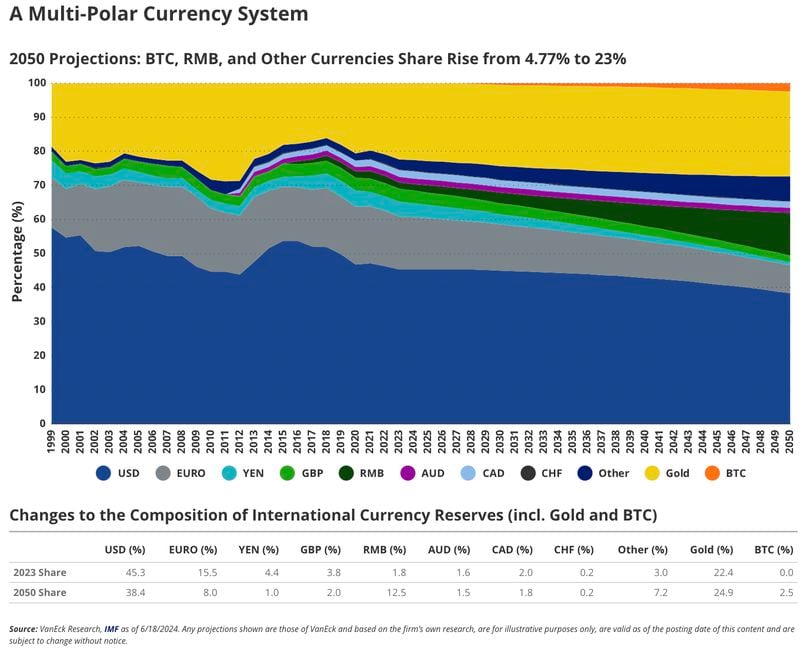News
VanEck Sees Bitcoin Hitting $2.9M by 2050 – but a Lot Has to Happen First
-
By 2050, bitcoin may settle 10% of international trade and 5% of local trade gain with central banks' holding it as a reserve asset, asset manager VanEck said in a report.
-
Bitcoin layer-2 networks will play a key role to overcome scaling issues and allow BTC to be used as a medium of exchange, the firm said.
-
There are risks for bitcoin's growth, including rising power demand, concerted government crackdowns and competition with other digital assets, the report said.
Asset manager VanEck, an issuer of spot bitcoin (BTC) and ether (ETH) ETFs, says that BTC's price may reach $2.9 million by 2050 – assuming some pretty high hurdles are cleared.
Under VanEck's assumptions in a Wednesday report , bitcoin would become an essential part of the international monetary system in the next decades as rising geopolitical tensions and ballooning debt servicing costs erode the current system.
"As we look at the world right now, we see enormous economic imbalances, rising distrust in existing institutions and continued deglobalization," Matthew Sigel, head of digital asset research at Van Eck and one of the report's authors, said in a Wednesday interview on CNBC.
"We think many of these distortions stem from ... a massive misallocation of capital since the global financial crisis as G7 governments have abused the printing press, spending borrowed money on impossible goals," Sigel explained.
"Bitcoin ... is the ultimate hedge against this rising fiscal recklessness," Sigel said.
In the report's base case scenario, BTC would become a key medium of exchange in local and global trade, representing 10% of international trade settlement and 5% of GDP.
Meanwhile, it would also gain as a global reserve asset at the expense of the four largest foreign reserve currencies – the U.S. dollar, euro, British pound and Japanese yen – reaching a 2.5% weight in international currency reserves.

If things play out as VanEck envisions, bitcoin's price will increase in value by 44 times, gaining 16% annually from its current price of just below $65,000. Its market capitalization would soar to $61 trillion.
The proliferation of layer-2 networks will play a key role in overcoming the Bitcoin blockchain's bottlenecks and scaling issues that prevent BTC from being a useful medium of exchange, the report said. The sector could collectively be worth $7.6 trillion by 2050, applying the same valuation framework as for Ethereum layer 2s.
VanEck also warned about potential risks ahead that could stifle bitcoin's expansion.
Increasing energy demand by miners will require innovation, while revenue from processing transactions has to grow dramatically to replace diminishing mining rewards (which get cut in half every four years via halvings ) to incentivize miners to sustain the network. Concerted efforts by governments around the world to restrict or outlaw bitcoin are also a threat.
Further risks highlighted in the report include competition from other cryptocurrencies and large financial institutions exerting too much control.

